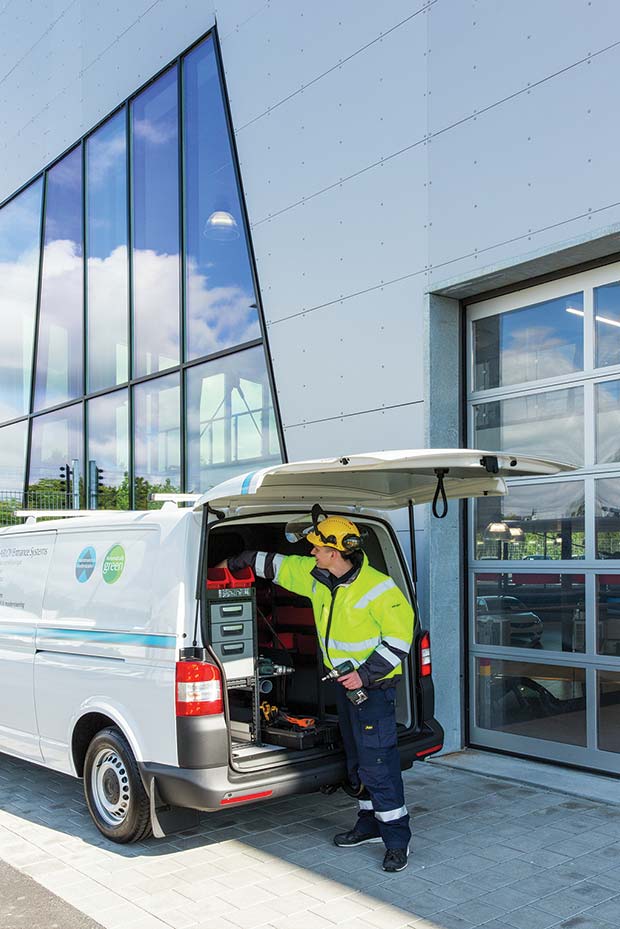Conscientious motorists will book in their vehicle for a winter service, knowing that the challenging weather conditions can take a toll on even the newest and most well-maintained car. It should be no different for loading bays and dock doors, but they are often overlooked at a time of year when they are under more pressure than any other.
 Gordon Smith, Industrial Door and Docking Systems Service Manager at ASSA ABLOY Entrance Systems UK, urges logistics managers to seriously consider the winter maintenance needs of dock doors and loading bays, particularly if they haven’t been serviced in the last 12 months.
Gordon Smith, Industrial Door and Docking Systems Service Manager at ASSA ABLOY Entrance Systems UK, urges logistics managers to seriously consider the winter maintenance needs of dock doors and loading bays, particularly if they haven’t been serviced in the last 12 months.
Equipment that has not been serviced in 2015 might seem to be coping well, but if the experiences of our maintenance team in 2014 teaches us anything, it is that loading bays should be ready for the worst to hit at any time.
A winter service for automated doors and docking equipment could be the difference between a fully operational peak period, and one fraught with breakdowns, workarounds and expensive reactive callouts in December, January and February. ASSA ABLOY Entrance Systems will always advise that scheduled maintenance be an intrinsic part of the preparation.
Preventing Downtime
Never is operational efficiency more important to a distribution centre than at peak times; fleet operators tell us that Christmas preparation takes a heavy toll. Working to honour orders and service level agreements puts pressure on the entire site, with increased activity at dock bays seeing doors, levellers and loading systems used more frequently and for longer. At the same time, low temperatures, frosts, snow and rain add additional strain on moving parts.
Industrial doors manufactured by reputable companies are designed to be robust and can cope with challenging environments and heavy usage. However, if the doors and loading equipment have not received regular maintenance, preventable wear and tear can have a detrimental impact.
The pursuit of minimal vehicles queue time is significantly affected by equipment failure. Yards clogged by waiting vehicles due to bay closures exacerbate avoidable downtime and can cause a domino effect of problems at the busiest time of the year. Planned preventive maintenance is a key tool to tackling the number of such instances.
Health & Safety
During the challenging winter months, distribution centres take care to thoroughly service vehicles to ensure the safety of drivers. It is therefore surprising that, in some instances, dock doors and loading bays are not given the same level of attention and care.
The peak periods not only intensify pressure on the equipment, but also on the operators. Pair that with the health and safety risks created by frost, ice and other weather conditions and it becomes critically important to take extra steps to ensure the safety of staff.
If you wouldn’t put a driver in a vehicle that hadn’t had a winter service, should you really risk having an employee operating loading equipment that hasn’t had the same treatment?
Repair Costs
Every vehicle owner knows that ignoring minor problems can turn into an expensive mistake when left to deteriorate. The principle for docking doors and equipment is the same.
Fixing wear and tear may seem like an avoidable expense both in time and upfront cost, when output demands are at peak. However, those issues that you can “be lived with” could escalate into full-scale shut down. In a worst case scenario, the resulting damage is irreparable requiring the entire system to be replaced: hiking the long term financial outlay, with the additional frustration of prolonged downtime and reduced delivery capacity.
Energy Efficiency
Heating large, open areas like warehouses and distribution centres can be expensive, even in mild conditions, and harsh winters compound the expense. Draught through industrial entrances creates an uncomfortable environment for staff, and hastens the loss of expensively heated air, often needlessly.
A thorough winter service not only ensures equipment is safe to operate, but also checks sealing around doors, levellers and shelters is in optimal condition. Awareness of equipment condition is important, helping you identify partial wear and tear before it becomes a problem and budget repairs accordingly.
The British winter is traditionally unpredictable, but the demands on logistics centres to operate at full capacity throughout winter remains. It is a challenge profitable logistics operations must meet. Ensuring that loading bays remain fully operational is imperative to meet the demands presented by the season.
Preparation is the key to avoiding complication. Winter service is a vital tool in the battle to minimise expensive downtime, reduce health and safety incidents, lessen the expense of reactive repairs and restrict energy wastage.




Comments are closed.